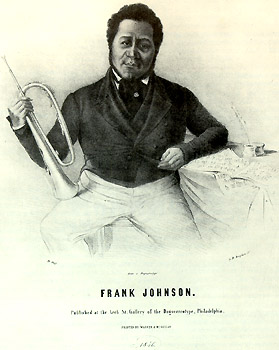
Rhiannon Giddens with her band at TFF Rudolstadt 2015 (Photo: Schorle, CC BY-SA 4.0, cropped, via Wikimedia Commons)
NASHVILLE, Tenn. (AP) — Grammy-winning folk singer and musician Rhiannon Giddens and pioneering composer Francis “Frank” Johnson will be the first recipients of the inaugural Legacy of Americana Award.
The Americana Music Association announced the new award Wednesday in partnership with the National Museum of African American Music. It will be presented to Giddens during the Americana Honors & Awards show on Sept. 11 in Nashville, Tennessee.
Giddens, from North Carolina, won a Grammy Award in 2011 for best traditional folk album with the string band the Carolina Chocolate Drops. She has spent her career exploring the history of African roots music.
She was named a fellow in 2017 by the Chicago-based MacArthur Foundation and received one of its “genius” grants to pursue her creative work. Giddens is also a nominee at the Americana Awards for artist of the year and duo/group of the year for her band Our Native Daughters.

Composer Francis Johnson in a contemporary etching [Public domain], via Wikimedia Commons
The Americana Music Association said in a statement that the new award has been created to honor those individuals who have “either made a lasting impression through music or inspired art to recognize the legacy of Americana music traditions.”
H. Beecher Hicks III, CEO and president of the National Museum of African American Music, which is set to open in Nashville in 2020, said they hope “to shine a light on forgotten artists like Frank Johnson, whose stories may have been lost to history, and on innovators like Rhiannon Giddens, who is pushing Americana and American music forward by exploring the past.”
Kristin M. Hall for the Associated Press.







